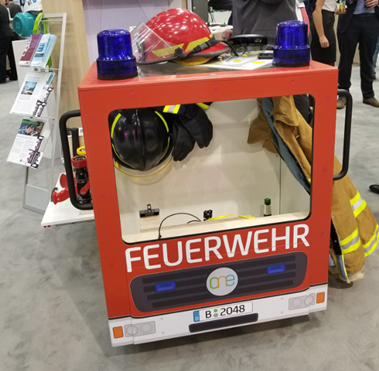
HMI 2017: IoT Is Changing Everything
I’m spending this week attending Hannover Messe, which bills itself as “the world’s largest industrial fair.” The moment I got off the tram line, I realized they weren’t kidding. The fairgrounds are the size of a small city.
But when you are host to 6,500+ exhibitors and 250,000 people, you need that much space to show off the global scale of innovation that’s happening across the manufacturing industry, especially since the Internet of Things (IoT) began to accelerate that pace of change a few years ago. And having spent the past two years managing our client Microsoft’s IoT blog, I really wanted to see how businesses of all sizes are using IoT to deliver greater value to their customers.
Here are a few of things I learned about on day 1:
Digital twinning
Have you ever wanted a twin? A lot of the big IoT solution providers —Microsoft, GE and Siemens, to name a few — are making it possible. A “digital twin” is a virtual representation of a physical entity or system. Digital twinning is a powerful tool when combined with IoT, because it lets businesses simulate how any change they make to a system will affect productivity, as well as time and cost efficiencies. This creates huge value for manufacturers, who are understandably cautious about implementing a solution that could shut down production if anything goes awry. With digital twinning, it becomes possible to quickly test as many scenarios as you need with minimal risk, making it easier to make a quick fix or to discover where is the best place to begin with an IoT solution.
Real-time data
Imagine being able to fix something before it breaks — sounds like The Minority Report for products, right? It’s called “predictive maintenance,” and it’s possible because IoT enables access to real-time data, which provides near-instantaneous updates on machines equipped with sensors that can track temperature, voltage, velocity and much more. Combined with advanced analytics, IoT delivers game-changing capabilities for any business.
HoloLens
We all know Microsoft is a leader in developing software IoT solutions, but now we’re seeing more and more examples of companies transforming their business models with a piece of Microsoft hardware: HoloLens. Thyssenkrupp Elevators was the first to use it, enabling field service technicians to share their workspace virtually with support agents to resolve maintenance issues much faster than before. Now other enterprises such as Tetra Pak are doing the same, shaving even years off the time needed to properly train a new field service tech.
And these trends lead to some pretty cool IoT use-cases:
Volkswagen
Using HoloLens plus digital twinning, VW is radically accelerating its design and engineering processes by having design/engineering teams work and iterate on virtual models. Moving away from physical models built of clay saves tremendous time and cost and probably means more visually striking and technically advanced vehicles in the years ahead.
 hhpberlin
hhpberlin
This fire protection company hasa fascinating story of a local German organization that is trying to rethink our approach to firefighting. It is working with fire departments and municipalities in Germany and the U.S. to pull their data into a standardized framework that allows you to create fire dynamic simulations of any size and complexity. In this case it’s a great use of digital twinning not to improve business, but to save lives. Hhpberlin has more interesting ideas in place to incorporate HoloLens in ways that can deliver up-to-date information during emergencies in a mixed-reality display, empowering firefighters to make more informed decisions when every second counts.
This is just a small snapshot of everything going on at HMI this year, but it paints an exciting picture for the future of IoT — check out the WE Twitter and Instagram feeds for more insights from the event, and stay tuned for my next blog from Hannover Messe later this week.
This is part 1 of a 2 part series from Hannover Messe. Read part 2 here.
Connect with the author, Shaan Khan, on Twitter.
The latest blogs from WE
Decoding Gen Alpha: A Primer on the Next Gen of Consumers
Why Gen Alpha Will Fuel Spending This Season
Why Reputation Is a Business Driver in Healthcare


